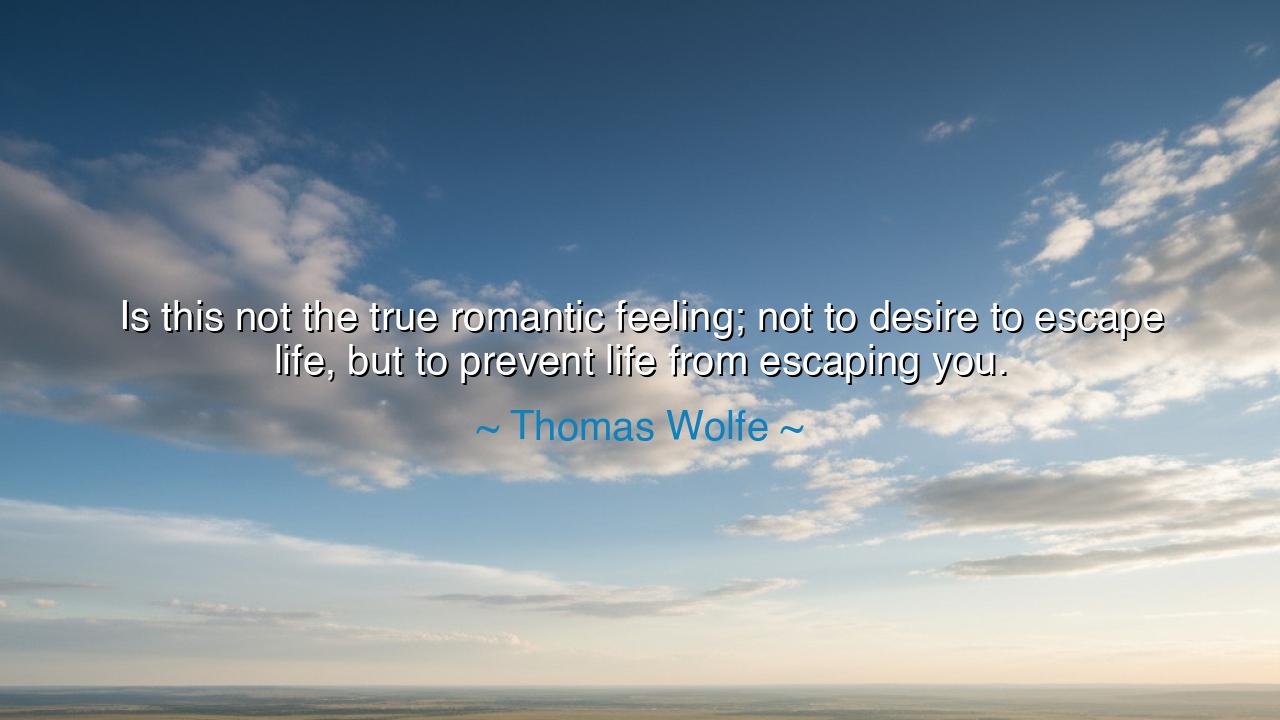
Is this not the true romantic feeling; not to desire to escape
Is this not the true romantic feeling; not to desire to escape life, but to prevent life from escaping you.






“Is this not the true romantic feeling; not to desire to escape life, but to prevent life from escaping you.” Thus wrote Thomas Wolfe, prophet of yearning and chronicler of the human spirit’s vast hunger. In this saying lies a truth that cuts deeper than any fleeting notion of sentimentality. To be truly romantic is not to retreat from the world into idle fantasy, but to hold fiercely to life itself, to clutch its moments, its beauty, its anguish, and not let them slip through your fingers like water through an open hand.
The romantic feeling, in its highest form, is not escape but embrace. Too often men think of romance as the building of castles in the air, the invention of dream-worlds where sorrow and struggle are forgotten. But Wolfe points to something greater: the passionate insistence that every hour, every breath, every love and loss, every sorrow and delight, must be lived fully. To prevent life from escaping you is to resist numbness, apathy, and distraction. It is to look upon the passing day and say: I will not let this be wasted.
The ancients understood this fierce embrace of life. Think of Odysseus, who wandered for twenty years, enduring storms, temptations, and despair, yet refused to surrender his longing for home, for love, for life itself. Many would have escaped into forgetfulness, into the enchanted slumber of Calypso’s isle, but Odysseus chose the harder path—life in all its pain and imperfection. That was the true romantic feeling: not to flee the world’s burden, but to cling to the fullness of being human.
History offers us other examples. Consider the poet John Keats, who, even as illness consumed him, poured his passion into verse, writing of beauty and eternity with the intensity of one determined not to let life escape him. His days were short, but his grasp of existence was fierce, so much so that his words continue to burn with vitality centuries after his death. Keats did not escape life; he drank it to the dregs, and in doing so preserved it for us all.
To prevent life from escaping you is to cultivate presence—to dwell in the moment, yet also to see its place in the eternal. Too often, life slips away not because it is short, but because we are inattentive. Hours vanish in triviality, in dullness of spirit, in endless routine. The true romantic seizes the moment, not by fleeing reality, but by exalting it—by seeing the divine spark in the ordinary, the glory in the passing, the wonder in the mundane.
The lesson here is powerful: do not waste your days dreaming only of escape. Instead, awaken to the gift of the life you already possess. Refuse to let the hours drain away unmarked, unloved, unremembered. Guard your days as treasures, for they are fleeting, and once gone, no longing can restore them. Be the one who clings to life with reverence, who does not let joy or sorrow slip unnoticed.
Practical action follows naturally: slow yourself enough to feel the moment, yet burn with enough passion to seize it. Write the letter, sing the song, take the journey, speak the truth, hold the hand. Do not drift in apathy. Do not wait endlessly for tomorrow. For the true romantic feeling, as Wolfe teaches, is not found in escape, but in presence, in vigilance, in the refusal to let life escape you.
So, children of tomorrow, remember Thomas Wolfe’s words. Do not seek to escape life, for that is the path of forgetfulness. Instead, embrace it with both hands, with eyes open and heart aflame. Let no day slip from your grasp unnoticed. In this way, your life, however long or short, will be full—not of fantasies, but of the living fire of reality itself. And that, indeed, is the truest romance of all.






AAdministratorAdministrator
Welcome, honored guests. Please leave a comment, we will respond soon